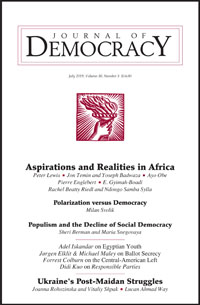
Backsliding/IDEA
Since the time of Plato, political thinkers have argued that a pro-democratic public is necessary for a stable and vital democracy. But others have countered that opinions are just cheap talk that have little impact on political outcomes. New research considers what 30 years of cross-national survey data – including from the Varieties of Democracy project – can tell us about this debate, notes Christopher Claassen (@chris__claassen), a lecturer in politics at the University of Glasgow.
High levels of public support for a democratic system help protect democratic institutions and principles from backsliding. In contrast, low levels of public support provide favorable conditions for the emergence of populist authoritarian leaders who attack democratic institutions. The beneficial effects of public support are limited to already-democratic countries, he writes for The Post’s Monkey Cage blog:
 So public support helps sustain democracy, but it doesn’t appear to push autocrats to liberalize their political systems. Autocracies are not only less responsive to public opinion than democracies, they are also more able to repress dissent. …Rather, the data suggest it is principled support for democracy that helps democracy survive. This finding chimes with a theory that political systems are more stable when their rules and procedures are “congruent” with the values of the public, rather than when the system generates material or policy benefits for citizens.
So public support helps sustain democracy, but it doesn’t appear to push autocrats to liberalize their political systems. Autocracies are not only less responsive to public opinion than democracies, they are also more able to repress dissent. …Rather, the data suggest it is principled support for democracy that helps democracy survive. This finding chimes with a theory that political systems are more stable when their rules and procedures are “congruent” with the values of the public, rather than when the system generates material or policy benefits for citizens.
Citizens’ protests are likely to be more successful in supporting an existing democracy — the Czech Republic, for instance — than in installing democracy where it doesn’t already exist — such as Hong Kong, Claassen concludes. RTWT







